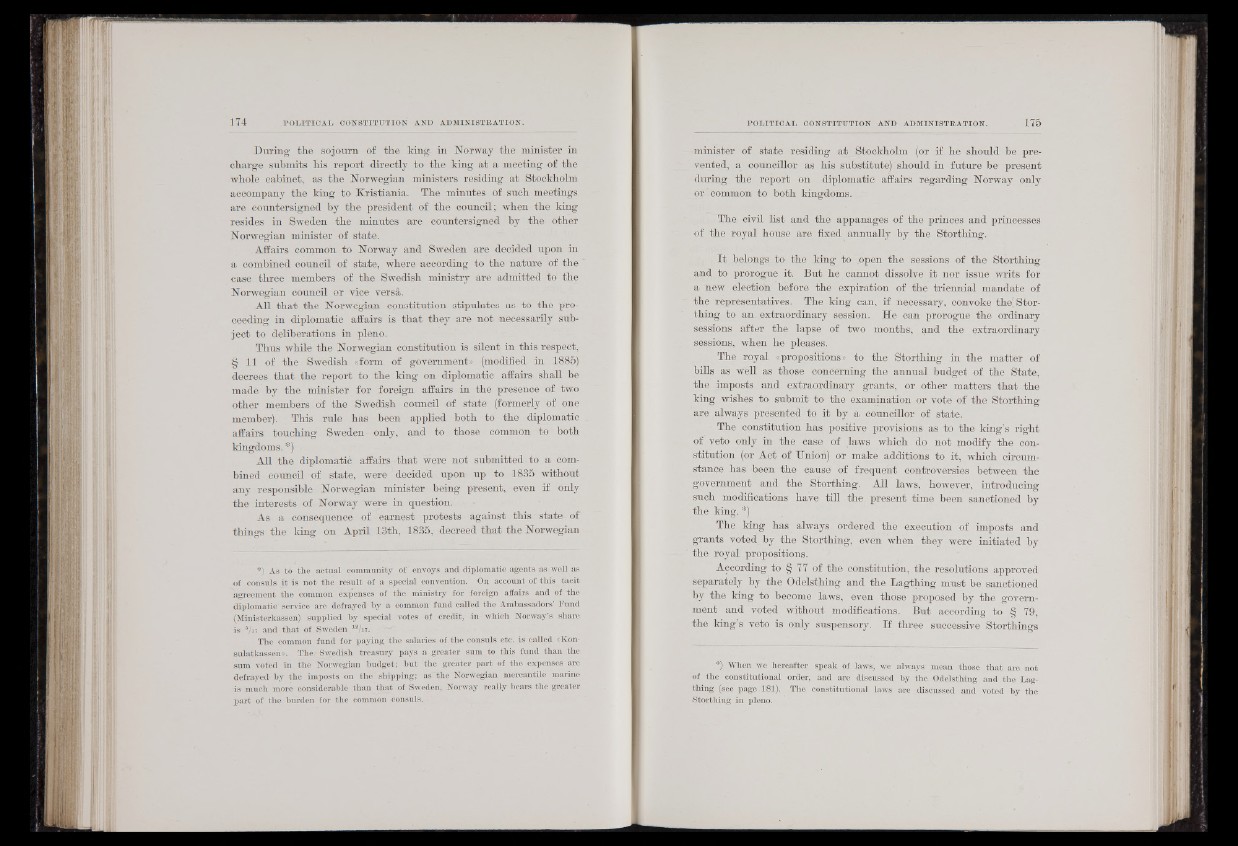
During the sojourn of the king in Norway the minister in
charge submits his report directly to the king at a meeting of the
whole cabinet, as the Norwegian ministers residing at Stockholm
accompany the king to Kristiania. The minutes of such meetings
are countersigned by the president of the council; when the king
resides in Sweden the minutes are countersigned by the other
Norwegian minister of state.
Affairs common to Norway and Sweden are decided upon in
a combined council of state, where according to the nature of the
case three members of the Swedish ministry are admitted to the
Norwegian council or vice versa.
All that the Norwegian constitution stipulates as to the proceeding
in diplomatic affairs is that they are not necessarily subject
to deliberations in pleno.
Thus while the Norwegian constitution is silent in this respect,
§ 11 of the Swedish «form of government» (modified in 1885)
decrees that the report to the king on diplomatic affairs shall be
made by the minister for foreign affairs in the presence of two
other members of the Swedish council of state (formerly of one
member). This rule has been applied both to the diplomatic
affairs touching Sweden only, and to those common to both
kingdoms. *)
All the diplomatic affairs that were not submitted to a combined
council of state, were decided upon up to 1835 without
any responsible Norwegian minister being present, even if only
the interests of Norway were in question.
As a consequence of earnest protests against this state of
things the king on April 13th, 1835, decreed that the Norwegian
_•) As to the actual community o f" envoys and diplomatic agents as well as
of consuls i t is not the result of a special convention. On account of this tacit
agreement the common expenses of the ministry for foreign affairs and of the
diplomatic service are defrayed hy a common fund called the Ambassadors’ Fund
(Ministerkassen) supplied hy special votes of credit, in which Norway’s share
is V17 and th a t of Sweden 12/i7. x
The common fund for paying the salaries of the consuls etc, is called «Kon-
sulatkassen». The; Swedish treasury pays a greater sum to this fund than the
sum voted in the Norwegian budget; hut the greater part of the expenses are
defrayed hy the imposts on the shipping; as "the Norwegian mercantile marine
i s much more considerable than thgt of Sweden, Norway really hears the greater
p a rt of the burden for the common consuls.
minister of state residing at Stockholm (or if he should be prevented,
a councillor as his substitute) should in future be present
during the report on diplomatic affairs regarding Norway only
or common to both kingdoms.
The civil list and the appanages of the princes and princesses
of the royal house are fixed annually by the Storthing.
It belongs to the king to .open the sessions of the Storthing
and to prorogue it. But he cannot dissolve it nor issue writs for
a new election before the expiration of the triennial mandate of
the representatives. The king can, if necessary, convoke the) Storthing
to an extraordinary session. He can prorogue the ordinary
sessions after the lapse of two months, and the extraordinary
sessions, when he pleases.
The royal «propositions» to the Storthing in the matter of
bills as well as those concerning the annual budget of the State,
the imposts and extraordinary grants, or other matters that the
king wishes to submit to the examination or vote of the Storthing
are always presented to it by a councillor of state.
The constitution has positive provisions as to the king’s right
of veto only in the case of laws which do not modify the constitution
(or Act of Union) or make additions to it, which circumstance
has been the cause of frequent controversies between the
government and the Storthing. All laws, however, introducing
such modifications have till the present time been sanctioned by
the king. *)
The king has always ordered the execution of imposts and
grants voted by the Storthing, even when they were initiated by
the royal propositions.
According to § 77 of the constitution, , the resolutions approved
separately by the Odelsthing- and the Lagthing must be sanctioned
by the king to become laws, even those proposed by the government
and voted without modifications. But according to § 79,
the king’s veto is only suspensory. If three successive Storthings
*). When we hereafter speak of laws, we always mean those th a t are not
of the constitutional order, and are discussed, hy the Odelsthing and the Lagthing
(see page . 181), The constitutional laws are discussed and voted hy the
■Storthing in pleno.